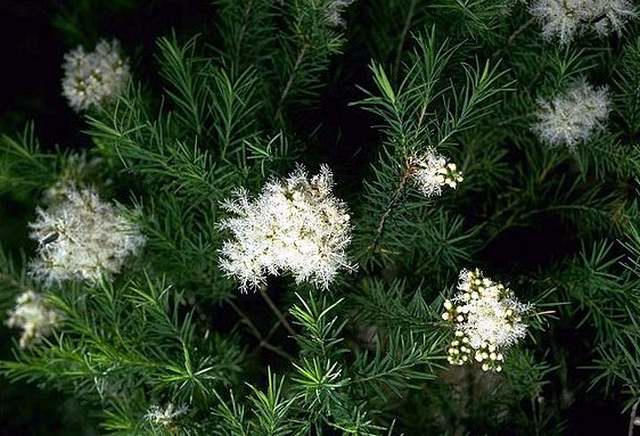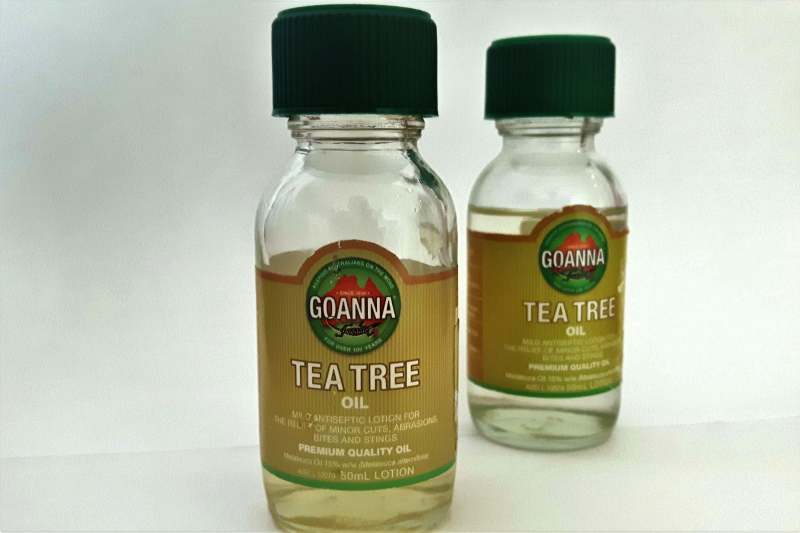This post contains affiliate links. If you click on a link and make a purchase I earn a commission at no extra cost for you.
Applying a few drops of tea tree oil to clothing or lightly on the lower legs is sometimes suggested as a way to deter ticks. While it has a strong, medicinal scent and contains a complex mix of around 100 chemical compounds, scientific evidence supporting its ability to repel ticks is limited and inconsistent.
Does tea tree oil repel ticks?
The actual effectiveness of tea tree oil as a tick repellent is questionable.
Research indicates that tea tree oil (Melaleuca alternifolia) shows potential as both an acaricide (tick-killing agent) and a repellent against various tick species, primarily in laboratory settings. However, its effectiveness as a reliable tick repellent for human use in real-world conditions is not definitively established, and experts often recommend caution.
Several studies have demonstrated that tea tree oil, particularly at certain concentrations, can lead to tick mortality and inhibit their ability to lay eggs. For instance, research has shown that specific concentrations of tea tree oil can achieve high rates of reproductive inhibition and acaricidal effects on certain types of ticks. In laboratory tests, tea tree oil has also exhibited repellent properties against tick larvae, with higher concentrations providing greater initial protection.
What is Tea tree oil?

Tea tree oil is an essential oil extracted from the leaves of the tea tree (Melaleuca alternifolia), a plant native to the swampy forests of Queensland and parts of Western Australia. These moist, subtropical environments are ideal breeding grounds for parasites and fungi, prompting native plants like the tea tree to evolve natural chemical defenses—biocidal compounds that help repel insects, parasites, and microbial threats.
For centuries, Australian Aboriginal communities have used the leaves and bark of the tea tree (Melaleuca alternifolia) to soothe minor skin irritations and deter parasites from the skin and hair. Today, tea tree essential oil is widely marketed as a natural remedy for a range of skin conditions and infections.
It’s known disinfectant, antibacterial, antiviral, and antifungal properties may support the body in managing certain skin ailments. In addition to its potential to repel mites, ticks, fleas, and lice, tea tree oil is sometimes used to help eliminate these parasites.
Extraction of Tea Tree Oil
 Tea tree oil is extracted from the small, elongated leaves of the Tea Tree (botanical name Melaleuca alternifolia) by using steam distillation.
Tea tree oil is extracted from the small, elongated leaves of the Tea Tree (botanical name Melaleuca alternifolia) by using steam distillation.
There are over 100 different substances that work together in tea tree oil and give the oil its biocidal properties that are effective against certain insects and ticks.
The oil consists largely of terpenes (a type of essential oil): Terpinen-4-ol, α-terpinene, and cineole. The latter is considered an impurity. The level of cineole is low in high-quality tea tree oil.
Tea tree oil is inexpensive and non-toxic when used externally as recommended. It must NOT be taken internally and is NOT recommended for children. Always read the label and use tea tree oil only as recommended.
Uses of the tree oil
1. Skin Care and Acne Treatment
Tea tree oil is a popular ingredient in skincare products, especially for treating acne-prone skin. Its natural antibacterial and anti-inflammatory properties help reduce redness, swelling, and the bacteria that contribute to breakouts. You’ll often find it in facial cleansers, spot treatments, and toners aimed at oily or blemish-prone skin. Unlike harsh chemical treatments, tea tree oil can be a gentler option for mild to moderate acne. However, because it can be irritating in high concentrations, it’s usually diluted in formulas or recommended to be used with a carrier oil when applied directly to the skin.
2. Hair and Scalp Health
Tea tree oil is also commonly used in hair care products to promote a healthy scalp and manage dandruff. Its antifungal properties can help combat the yeast-like fungus Malassezia, which is often linked to flaking and itching. Shampoos and conditioners infused with tea tree oil are marketed to soothe irritation, unclog hair follicles, and reduce scalp buildup. Some users also apply diluted tea tree oil directly to the scalp to treat conditions like seborrheic dermatitis. While it offers natural relief for some, it’s important to do a patch test first, as tea tree oil can cause allergic reactions in sensitive skin.
3. Oral Health and Hygiene
In oral care, tea tree oil is valued for its ability to reduce inflammation and fight bacteria. It can be found in natural mouthwashes, toothpastes, and even dental gels aimed at treating gum disease and reducing bad breath. The oil’s antiseptic properties may help lower the risk of plaque buildup and gingivitis. However, since tea tree oil is toxic if swallowed, it must be used with caution in oral products and never ingested. When used correctly in small, controlled amounts, it can support a healthier mouth—especially for those looking to avoid artificial chemicals and harsh alcohol-based rinses.
4. First Aid and Minor Skin Issues
Tea tree oil has long been used in natural first-aid remedies to treat minor cuts, burns, insect bites, and skin infections. Thanks to its antimicrobial and anti-inflammatory qualities, it can help prevent infection while soothing irritation. Many over-the-counter creams, ointments, and balms include tea tree oil to aid in wound healing or to relieve itching from rashes and bug bites. Some people also use it to manage fungal infections like athlete’s foot or nail fungus. Although generally effective for mild conditions, tea tree oil should always be diluted and used with care to avoid skin sensitization or allergic reactions.
Summary: Does Tea Tree Oil Repel Ticks?
With tick-borne illnesses on the rise, many people are looking for natural ways to keep ticks away. Tea tree oil, known for its strong scent and natural antibacterial properties, has shown promise in lab tests. Some studies found that it can kill certain types of ticks and even stop them from reproducing. In the lab, specific concentrations of tea tree oil repelled ticks for up to 24 hours—and in some cases, even longer.
However, just because it works well in a lab doesn’t mean it works the same way in the real world. So far, tea tree oil hasn’t been proven to reliably prevent tick bites in everyday outdoor settings. Major health authorities like the EPA don’t list it as an approved tick repellent. In fact, traditional repellents like DEET, picaridin, and oil of lemon eucalyptus are still considered more effective and better tested.
Also, tea tree oil can irritate the skin if used without dilution, and it’s toxic if swallowed. If you do decide to try it, always dilute it with a carrier oil and do a patch test first.
Bottom line: While tea tree oil shows potential in controlled settings, it’s not a substitute for proven tick repellents. For reliable protection, stick with products that are tested, approved, and recommended by health experts.
See the 5 best popular tick repellents
| Attention: There are recommendations to put a drop of tea tree oil onto a tick before pulling it out. DO NOT DO THAT!
DO NOT try to remove a tick that is already feeding by putting tea tree oil on it. This may trigger a shock in the tick, which leads to increased salivation and potential transfer of bacteria or viruses.. |
Tea Tree 100% Pure Essential Oil
-
⚠️ Important Safety Tips:
- Always dilute with a carrier oil (like coconut or jojoba) before applying to skin.
- Patch test first to check for allergic reactions.
- Do not ingest – tea tree oil is toxic if swallowed.
- Keep away from pets, especially cats and dogs.
Safety Warning:
In rare cases, Tea tree oil may cause skin irritation. To check for an allergic reaction before use, apply a very small amount to the skin inside your elbow area to test for any reaction. If a rash occurs, consult your healthcare professional.
- Tea tree oil is for external use only.
- Avoid contact with the eyes. Keep out of reach of children. If pregnant, consult with your doctor before use.
- Use only as recommended and DO NOT take tea tree oil orally.
Tea Tree Oil and Dogs
Some natural shampoos include a very low concentration of tea tree oil (usually under 1%) to help deter fleas and ticks.
Tea tree oil can be harmful to dogs if misused. Avoid DIY recipes unless advised by a vet. Only use properly formulated pet-safe products with your vet’s approval. Many other pet-safe alternatives for skin issues and parasite control may be safer and more effective.
The most effective tick protection for dogs comes from veterinary-approved, prescription-strength treatments such as oral chewables or topical spot-on applications.
Cats and Tea Tree Oil
Tea tree oil is toxic to cats and should never be used on or around them. Cats groom themselves frequently, so if tea tree oil is applied to their fur or skin, they’re likely to ingest it. The oil contains compounds like terpenes and phenols, which a cat’s liver cannot break down. These substances build up in the body and can lead to serious poisoning, even death. Symptoms may include drooling, weakness, tremors, or seizures. Even small amounts can be dangerous, so it’s best to avoid tea tree oil entirely in households with cats.
Only a few natural repellents may be used on cats; more effective are veterinary-approved synthetic spot-on repellents, that are especially made for cats.
Source and more Info
Influence of tea tree oil on cattle tick
https://pubmed.ncbi.nlm.nih.gov/24368704
Acaricidal Activity of Tea Tree and Lemon Oil
https://pubmed.ncbi.nlm.nih.gov/36558840/




